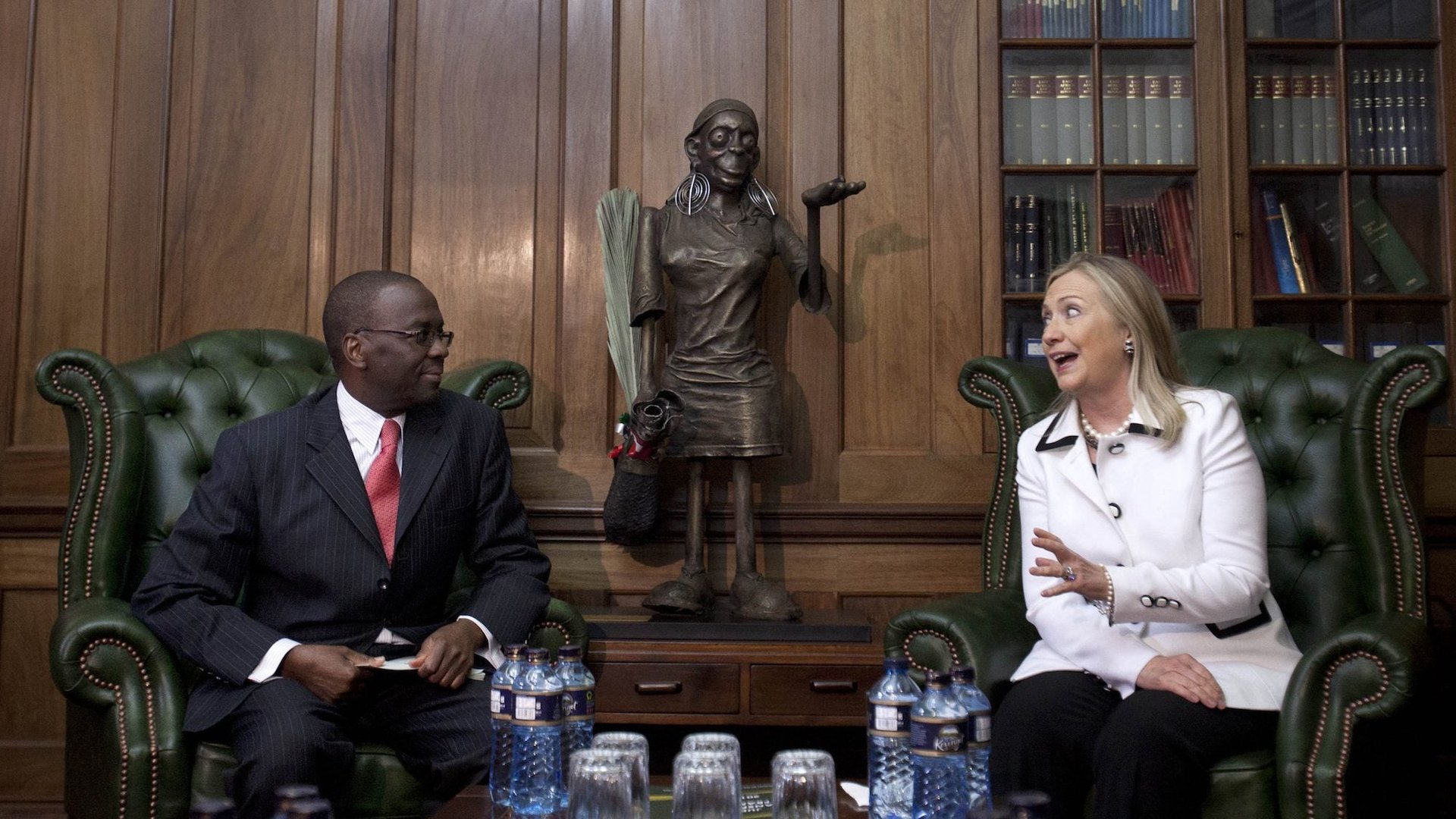In Kenya, Clinton supporters are naming their children after the woman they hope will become America’s next president
Nairobi, Kenya


Nairobi, Kenya
When Americans go to the polls on Nov. 8, more than 8,000 miles away in Kenya, a group of Hillary Clinton supporters will be anxiously waiting for the results. “I am praying every day for her to win,” says Nayasa Mawagos, a 34-year-old woman in northern Kenya.
Sixteen years ago, and six months after Clinton won a senate seat in New York, Mawagos named her eldest son Hillary. Mawagos, a single mother of two who supports her family by hawking chai, clothing, and snacks, admired Clinton’s boldness. In the recent days, she has been monitoring election news in the US closely and is confident her son’s namesake will win. “I know she will win that seat because she is a brave woman,” she says.
Others are nervous. Andrew Lekutas, whose five year old son is named Clinton, says he is praying hard for a Clinton victory. “It’s only hours left for Hillary to be sworn in as the first woman to be president of the most powerful country in the world, God willing,” he says.
There are few countries abroad watching the US election as closely as Kenya, whose cultural, economic, and diplomatic ties with America run deep. Groups huddle on sidewalks in downtown Nairobi, part of a citizen discussion forum better known as the “People’s Parliament,” to discuss the election and its parallels to Kenyan politics. Like Trump, Kenya’s president Uhuru Kenyatta’s wealth was believed to be a marker of his independence and incorruptibility. But his handling of government graft since winning power has been a disappointment.
Users in private group chats on WhatsApp also exchange news, links, and theories about the impact of the election on Kenya. Of potential trade deals and coffee exports from Kenya, one user wrote, “Trump doesn’t want that. He wants to do those kinds of deals with Russia and Peru.”
Here, the Clintons are a household name. Former president Bill Clinton’s sex scandal with intern Monica Lewinsky provided material for popular local comedians. Others know the family through the work of the Clinton Foundation and its partner organizations on improving the environment, public health, and climate change mitigation. Henry Lenayasa named his son, born in January, after Hillary whose work in Africa he recognized. “They are role models,” he said of the Clintons.
Meanwhile, Trump is considered antagonistic to Kenya. The hashtag #SomeoneTellDonaldTrump became popular in Kenya last year after Trump made derogatory remarks about Kenyan athletes. Kenya is also one of the top recipients of US aid, which Trump has called for reducing. Kenyans comprise one of the fastest-growing immigrant communities in the US, a crucial source of remittances back home, a trend that could change if Trump cuts down on immigration.
“Trump’s obsession with and attraction to the ‘nativist’ movement, which frowns on foreign entanglements, does not augur well for improved US-Kenya relations,” says John Mukum Mbaku, a nonresident senior fellow at Brookings Africa Growth Initiative and a professor of economics at Weber State University in Utah.
Some Clinton supporters in Kenya see her as only the lesser of two evils in an election that has dented America’s reputation here. The presidency of Barack Obama, whose father hails from Kenya, has been a source of pride for the country over the last eight years. (Obama, as well as Clinton, are popular first names for children here.)
“This election has made me realize the US is not the wisest of countries I thought it to be,” says David Baruch Otieno, who works in development in Nairobi.
Trump’s accusations of election rigging and casual dismissal of fundamental democratic processes uncomfortably echo those of despots in Africa and elsewhere clinging to power, as illustrated recently by Kenyan political cartoonist Gado:
A Clinton win could also be a source of inspiration in Kenya, which has never had a female president. Wilson Lereete, 24, named his first child, a daughter, Hillary. Lereete, a farmer and math teacher in Samburu County in northern Kenya, first noticed Clinton during her race for the Democratic presidential nomination in 2008.
“Most people do not like female leadership, especially here in Kenya. That’s why I gave my daughter that name because I want her to be a leader when she grows up and to challenge people,” he says. “She might even become president.”